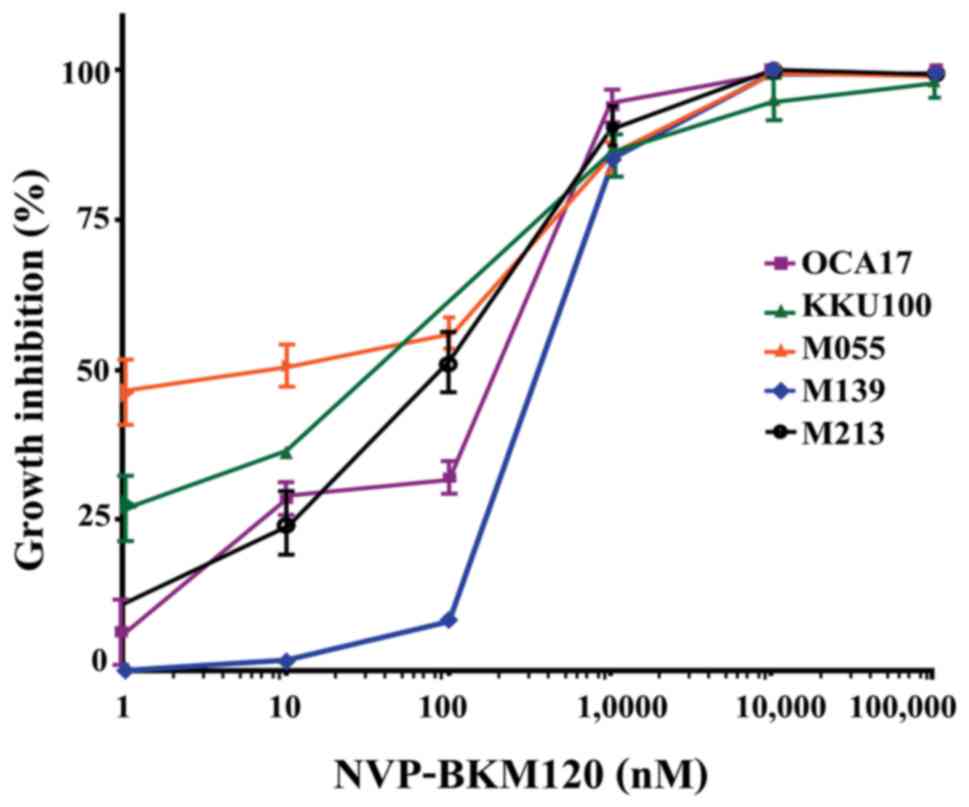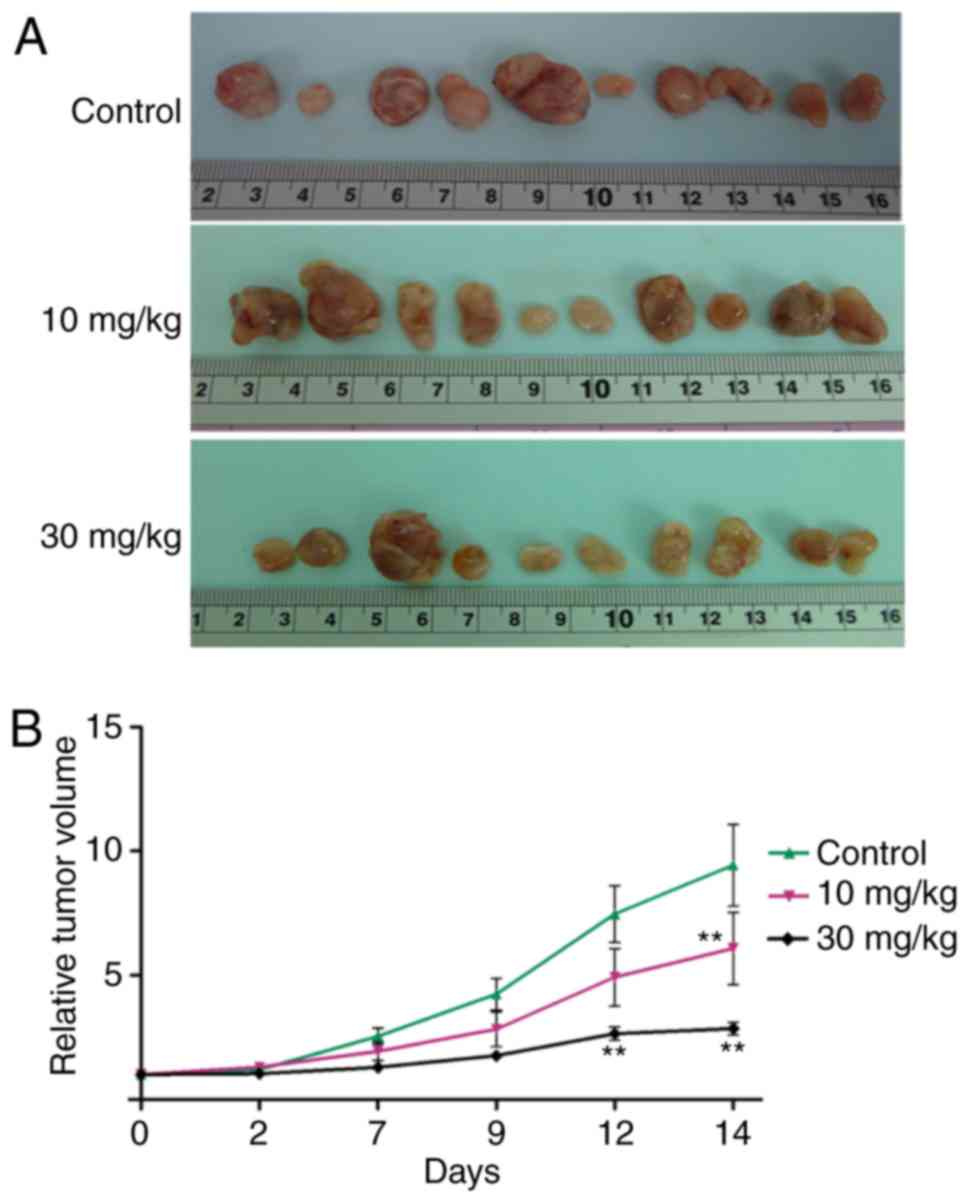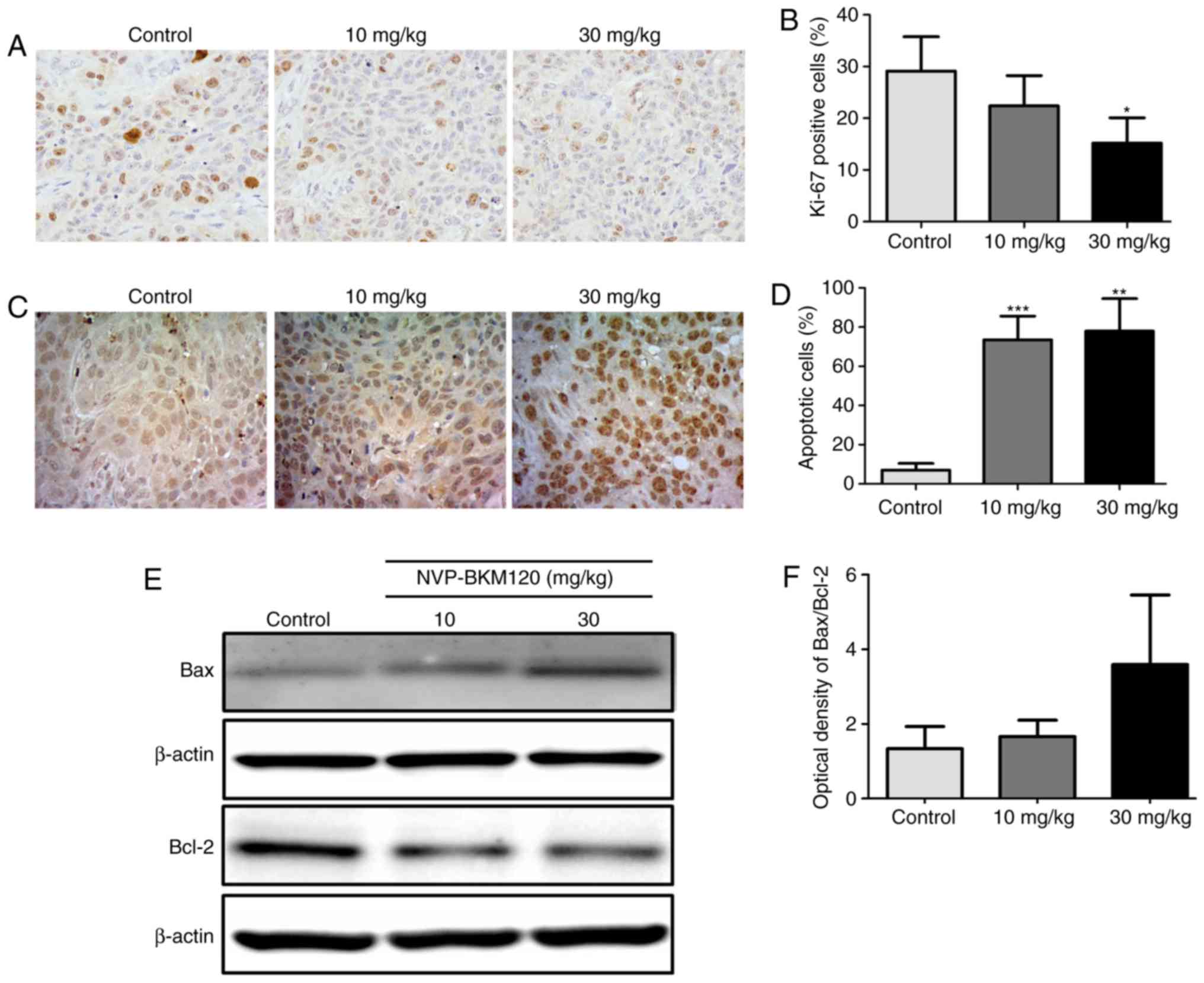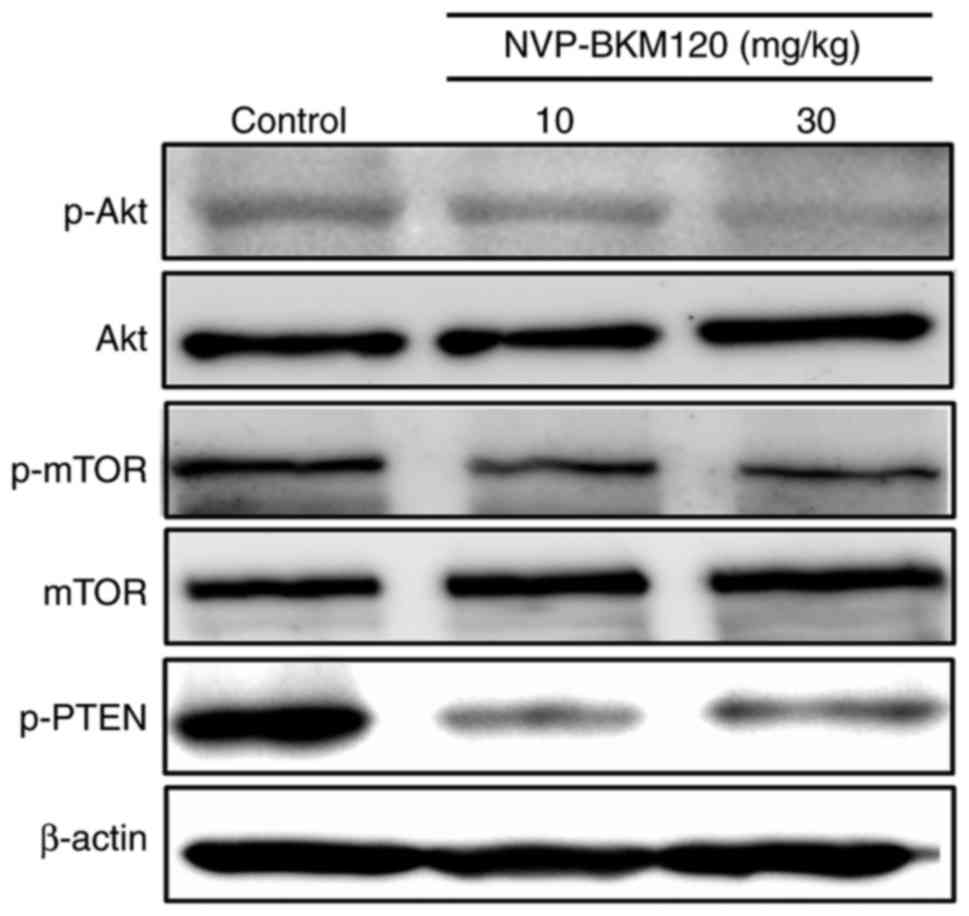|
1
|
Vatanasapt V, Sriamporn S and Vatanasapt
P: Cancer control in Thailand. Jpn J Clin Oncol. 32:(Suppl):.
S82–S91. 2002. View Article : Google Scholar : PubMed/NCBI
|
|
2
|
Parkin DM, Ohshima H, Srivatanakul P and
Vatanasapt V: Cholangiocarcinoma: Epidemiology, mechanisms of
carcinogenesis and prevention. Cancer Epidemiol Biomarkers Prev.
2:537–544. 1993.PubMed/NCBI
|
|
3
|
Thamavit W, Bhamarapravati N, Sahaphong S,
Vajrasthira S and Angsubhakorn S: Effects of dimethylnitrosamine on
induction of cholangiocarcinoma in Opisthorchis viverrini-infected
Syrian golden hamsters. Cancer Res. 38:4634–4639. 1978.PubMed/NCBI
|
|
4
|
Sripa B and Pairojkul C:
Cholangiocarcinoma: Lessons from Thailand. Curr Opin Gastroenterol.
24:349–356. 2008. View Article : Google Scholar : PubMed/NCBI
|
|
5
|
Banales JM, Cardinale V, Carpino G,
Marzioni M, Andersen JB, Invernizzi P, Lind GE, Folseraas T, Forbes
SJ, Fouassier L, et al: Expert consensus document:
Cholangiocarcinoma: Current knowledge and future perspectives
consensus statement from the European Network for the Study of
Cholangiocarcinoma) ENS-CCA). Nat Rev Gastroenterol Hepatol.
13:261–280. 2016. View Article : Google Scholar : PubMed/NCBI
|
|
6
|
Blechacz B and Gores GJ:
Cholangiocarcinoma: Advances in pathogenesis, diagnosis, and
treatment. Hepatology. 48:308–321. 2008. View Article : Google Scholar : PubMed/NCBI
|
|
7
|
Khan SA, Thomas HC, Davidson BR and
Taylor-Robinson SD: Cholangiocarcinoma. Lancet. 366:1303–1314.
2005. View Article : Google Scholar : PubMed/NCBI
|
|
8
|
Dokduang H, Juntana S, Techasen A, Namwat
N, Yongvanit P, Khuntikeo N, Riggins GJ and Loilome W: Survey of
activated kinase proteins reveals potential targets for
cholangiocarcinoma treatment. Tumour Biol. 34:3519–3528. 2013.
View Article : Google Scholar : PubMed/NCBI
|
|
9
|
Fresno Vara JA, Casado E, de Castro J,
Cejas P, Belda-Iniesta C and González-Barón M: PI3K/Akt signalling
pathway and cancer. Cancer Treat Rev. 30:193–204. 2004. View Article : Google Scholar : PubMed/NCBI
|
|
10
|
Yothaisong S, Dokduang H, Techasen A,
Namwat N, Yongvanit P, Bhudhisawasdi V, Puapairoj A, Riggins GJ and
Loilome W: Increased activation of PI3K/AKT signaling pathway is
associated with cholangiocarcinoma metastasis and PI3K/mTOR
inhibition presents a possible therapeutic strategy. Tumour Biol.
34:3637–3648. 2013. View Article : Google Scholar : PubMed/NCBI
|
|
11
|
DeGraffenried LA, Fulcher L, Friedrichs
WE, Grünwald V, Ray RB and Hidalgo M: Reduced PTEN expression in
breast cancer cells confers susceptibility to inhibitors of the PI3
kinase/Akt pathway. Ann Oncol. 15:1510–1516. 2004. View Article : Google Scholar : PubMed/NCBI
|
|
12
|
Shaw RJ and Cantley LC: Ras, PI(3)K and
mTOR signalling controls tumour cell growth. Nature. 441:424–430.
2006. View Article : Google Scholar : PubMed/NCBI
|
|
13
|
Shukla S, Maclennan GT, Hartman DJ, Fu P,
Resnick MI and Gupta S: Activation of PI3K-Akt signaling pathway
promotes prostate cancer cell invasion. Int J Cancer.
121:1424–1432. 2007. View Article : Google Scholar : PubMed/NCBI
|
|
14
|
Maira SM, Pecchi S, Huang A, Burger M,
Knapp M, Sterker D, Schnell C, Guthy D, Nagel T, Wiesmann M, et al:
Identification and characterization of NVP-BKM120, an orally
available pan-class I PI3-kinase inhibitor. Mol Cancer Ther.
11:317–328. 2012. View Article : Google Scholar : PubMed/NCBI
|
|
15
|
Allegretti M, Ricciardi MR, Licchetta R,
Mirabilii S, Orecchioni S, Reggiani F, Talarico G, Foà R, Bertolini
F, Amadori S, et al: The pan-class I phosphatidyl-inositol-3 kinase
inhibitor NVP-BKM120 demonstrates anti-leukemic activity in acute
myeloid leukemia. Sci Rep. 5:181372015. View Article : Google Scholar : PubMed/NCBI
|
|
16
|
Anderson JL, Park A, Akiyama R, Tap WD,
Denny CT and Federman N: Evaluation of in vitro activity of the
class I PI3K inhibitor Buparlisib (BKM120) in pediatric bone and
soft tissue sarcomas. PLoS One. 10:e01336102015. View Article : Google Scholar : PubMed/NCBI
|
|
17
|
Martin SK, Gan ZY, Fitter S, To LB and
Zannettino AC: The effect of the PI3K inhibitor BKM120 on tumour
growth and osteolytic bone disease in multiple myeloma. Leuk Res.
39:380–387. 2015. View Article : Google Scholar : PubMed/NCBI
|
|
18
|
Speranza MC, Nowicki MO, Behera P, Cho CF,
Chiocca EA and Lawler SE: BKM-120 (Buparlisib): A
phosphatidyl-inositol-3 kinase inhibitor with anti-invasive
properties in glioblastoma. Sci Rep. 6:201892016. View Article : Google Scholar : PubMed/NCBI
|
|
19
|
Chang KY, Tsai SY, Chen SH, Tsou HH, Yen
CJ, Liu KJ, Fang HL, Wu HC, Chuang BF, Chou SW, et al: Dissecting
the EGFR-PI3K-AKT pathway in oral cancer highlights the role of the
EGFR variant III and its clinical relevance. J Biomed Sci.
20:432013. View Article : Google Scholar : PubMed/NCBI
|
|
20
|
Malinowsky K, Nitsche U, Janssen KP, Bader
FG, Späth C, Drecoll E, Keller G, Höfler H, Slotta-Huspenina J and
Becker KF: Activation of the PI3K/AKT pathway correlates with
prognosis in stage II colon cancer. Br J Cancer. 110:2081–2089.
2014. View Article : Google Scholar : PubMed/NCBI
|
|
21
|
Sripa B, Leungwattanawanit S, Nitta T,
Wongkham C, Bhudhisawasdi V, Puapairoj A, Sripa C and Miwa M:
Establishment and characterization of an opisthorchiasis-associated
cholangiocarcinoma cell line (KKU-100). World J Gastroenterol.
11:3392–3397. 2005. View Article : Google Scholar : PubMed/NCBI
|
|
22
|
Sun SY, Yue P, Dawson MI, Shroot B, Michel
S, Lamph WW, Heyman RA, Teng M, Chandraratna RA, Shudo K, et al:
Differential effects of synthetic nuclear retinoid
receptor-selective retinoids on the growth of human non-small cell
lung carcinoma cells. Cancer Res. 57:4931–4939. 1997.PubMed/NCBI
|
|
23
|
Cantley LC: The phosphoinositide 3-kinase
pathway. Science. 296:1655–1657. 2002. View Article : Google Scholar : PubMed/NCBI
|
|
24
|
Carnero A, Blanco-Aparicio C, Renner O,
Link W and Leal JF: The PTEN/PI3K/AKT signalling pathway in cancer,
therapeutic implications. Curr Cancer Drug Targets. 8:187–198.
2008. View Article : Google Scholar : PubMed/NCBI
|
|
25
|
Chalhoub N and Baker SJ: PTEN and the
PI3-kinase pathway in cancer. Annu Rev Pathol. 4:127–150. 2009.
View Article : Google Scholar : PubMed/NCBI
|
|
26
|
Deng L, Chen J, Zhong XR, Luo T, Wang YP,
Huang HF, Yin LJ, Qiu Y, Bu H, Lv Q and Zheng H: Correlation
between activation of PI3K/AKT/mTOR pathway and prognosis of breast
cancer in Chinese women. PLoS One. 10:e01205112015. View Article : Google Scholar : PubMed/NCBI
|
|
27
|
Ocana A, Vera-Badillo F, Al-Mubarak M,
Templeton AJ, Corrales-Sanchez V, Diez-Gonzalez L, Cuenca-Lopez MD,
Seruga B, Pandiella A and Amir E: Activation of the PI3K/mTOR/AKT
pathway and survival in solid tumors: Systematic review and
meta-analysis. PLoS One. 9:e952192014. View Article : Google Scholar : PubMed/NCBI
|
|
28
|
Shi J, Yao D, Liu W, Wang N, Lv H, Zhang
G, Ji M, Xu L, He N, Shi B and Hou P: Highly frequent PIK3CA
amplification is associated with poor prognosis in gastric cancer.
BMC Cancer. 12:502012. View Article : Google Scholar : PubMed/NCBI
|
|
29
|
Koul D, Fu J, Shen R, LaFortune TA, Wang
S, Tiao N, Kim YW, Liu JL, Ramnarian D, Yuan Y, et al: Antitumor
activity of NVP-BKM120-a selective pan class I PI3 kinase inhibitor
showed differential forms of cell death based on p53 status of
glioma cells. Clin Cancer Res. 18:184–195. 2012. View Article : Google Scholar : PubMed/NCBI
|
|
30
|
Hu Y, Guo R, Wei J, Zhou Y, Ji W, Liu J,
Zhi X and Zhang J: Effects of PI3K inhibitor NVP-BKM120 on
overcoming drug resistance and eliminating cancer stem cells in
human breast cancer cells. Cell Death Dis. 6:e20202015. View Article : Google Scholar : PubMed/NCBI
|
|
31
|
Liang YC, Wu HG, Xue HJ, Liu Q, Shi LL,
Liu T and Wu G: Effects of PI3K inhibitor NVP-BKM120 on acquired
resistance to gefitinib of human lung adenocarcinoma H1975 cells. J
Huazhong Univ Sci Technolog Med Sci. 33:845–851. 2013. View Article : Google Scholar : PubMed/NCBI
|
|
32
|
Ayub A, Yip WK and Seow HF: Dual
treatments targeting IGF-1R, PI3K, mTORC or MEK synergize to
inhibit cell growth, induce apoptosis, and arrest cell cycle at G1
phase in MDA-MB-231 cell line. Biomed Pharmacother. 75:40–50. 2015.
View Article : Google Scholar : PubMed/NCBI
|
|
33
|
Filbin MG, Dabral SK, Pazyra-Murphy MF,
Ramkissoon S, Kung AL, Pak E, Chung J, Theisen MA, Sun Y,
Franchetti Y, et al: Coordinate activation of Shh and PI3K
signaling in PTEN-deficient glioblastoma: New therapeutic
opportunities. Nat Med. 19:1518–1523. 2013. View Article : Google Scholar : PubMed/NCBI
|
|
34
|
Civallero M, Cosenza M, Pozzi S, Bari A,
Ferri P and Sacchi S: Activity of BKM120 and BEZ235 against
Lymphoma Cells. Biomed Res Int. 2015:8709182015. View Article : Google Scholar : PubMed/NCBI
|
|
35
|
Roper J, Sinnamon MJ, Coffee EM, Belmont
P, Keung L, Georgeon-Richard L, Wang WV, Faber AC, Yun J, Yilmaz
ÖH, et al: Combination PI3K/MEK inhibition promotes tumor apoptosis
and regression in PIK3CA wild-type, KRAS mutant colorectal cancer.
Cancer Lett. 347:204–211. 2014. View Article : Google Scholar : PubMed/NCBI
|
|
36
|
Pereira JK, Machado-Neto JA, Lopes MR,
Morini BC, Traina F, Costa FF, Saad ST and Favaro P: Molecular
effects of the phosphatidylinositol-3-kinase inhibitor NVP-BKM120
on T and B-cell acute lymphoblastic leukaemia. Eur J Cancer.
51:2076–2085. 2015. View Article : Google Scholar : PubMed/NCBI
|
|
37
|
Park E, Park J, Han SW, Im SA, Kim TY, Oh
DY and Bang YJ: NVP-BKM120, a novel PI3K inhibitor, shows synergism
with a STAT3 inhibitor in human gastric cancer cells harboring KRAS
mutations. Int J Oncol. 40:1259–1266. 2012. View Article : Google Scholar : PubMed/NCBI
|
|
38
|
Matas-Céspedes A, Rodriguez V, Kalko SG,
Vidal-Crespo A, Rosich L, Casserras T, Balsas P, Villamor N, Giné
E, Campo E, et al: Disruption of follicular dendritic
cells-follicular lymphoma cross-talk by the pan-PI3K inhibitor
BKM120)Buparlisib). Clin Cancer Res. 20:3458–3471. 2014. View Article : Google Scholar : PubMed/NCBI
|


















